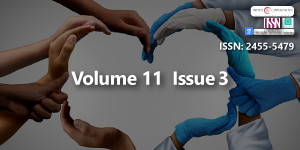Unseen and Unspoken: A Content Analysis of Public Health Messaging on HIV and Black Women in the American South
Main Article Content
Abstract
Abstract
The ongoing HIV epidemic is not only a public health crisis but also a profound story of social justice, particularly for communities of color. Despite advancements in treatment and prevention, Black and Brown communities, especially in the Southern United States, continue to bear a disproportionate burden of HIV. Mississippi, along with eight other Southern states, has reached epidemic status, with rising case rates particularly among individuals aged 13–24. Yet media coverage remains sparse. This literature review presents a content analysis of HIV-related public health messaging from federal, state, and nonprofit sources between 2020 and 2024. It examines representation, framing, cultural competence, and calls to action across six Southern states. The study finds that Black women remain underrepresented in both messaging and media coverage, and that structural determinants of HIV risk are often overlooked in favor of individual behavior narratives. Findings underscore the need for journalism and public health communication to adopt culturally competent, community-informed strategies that give voice to those most affected.
Downloads
Article Details
Copyright (c) 2025 Smith MS.

This work is licensed under a Creative Commons Attribution-NonCommercial 4.0 International License.
Kaiser Family Foundation. The impact of HIV on women in the United States. 2024. Available from: https://www.kff.org/hivaids/fact-sheet/the-impact-of-hiv-on-women-in-the-united-states/
Varner PR. HIV then and now: The power of innovation [conference session]. Tougaloo College, Jackson, MS, United States. 2024. Available from: https://allevents.in/jackson/hiv-then-and-now-the-power-of-innovation/100001020604003047
Gilead Sciences. COMPASS Initiative®: Addressing HIV in the Southern United States. Foster City (CA): Gilead Sciences; 2023. Available from: https://www.gilead.com/responsibility/giving-at-gilead/corporate-giving/strategic-initiatives/compass-initiative
ViiV Healthcare. Risk to Reasons grantee summary. Washington (DC): International Association of Providers of AIDS Care; 2019.
ViiV Healthcare. Breaking the silence: The intersection of mental health, sexual wellness, and HIV in the Black community [conference session]. W.E.B. Du Bois Plenary, National Association of Black Journalists 2025 Convention, Cleveland, OH, United States. 2025 Aug.
Johnson KA, Binion S, Waller B, Sutton A, Wilkes S, Payne-Foster P, et al. Left behind in the US’ Deep South: Addressing critical gaps in HIV and intimate partner violence prevention efforts targeting Black women. Front Reprod Health. 2022;4:1008788. Available from: https://doi.org/10.3389/frph.2022.1008788 DOI: https://doi.org/10.3389/frph.2022.1008788
Diallo M, Duncombe C, Zúñiga J. An exploratory survey into the quality of life of people living with HIV in 15 Fast-Track Cities. Washington (DC): International Association of Providers of AIDS Care; 2019. Available from: https://www.iapac.org/files/2019/09/FTCQOLSURVEYFINAL.pdf
Randolph SD, Golin C, Welgus H, Lightfoot AF, Harding CJ, Riggins LF. How perceived structural racism and discrimination and medical mistrust in the health system influences participation in HIV health services for black women living in the United States South: a qualitative, descriptive study. J Assoc Nurses AIDS Care. 2020;31(5):598–605. Available from: https://journals.lww.com/janac/abstract/2020/10000/how_perceived_structural_racism_and_discrimination.12.aspx?context=featuredarticles&collectionid=1 DOI: https://doi.org/10.1097/JNC.0000000000000189
Adimora AA, Ramirez C, Schoenbach VJ, Cohen MS. Ending the HIV epidemic: Racial justice and equity are integral to ending the HIV epidemic in the United States. Lancet. 2021;397(10279):1151–3. Available from: https://doi.org/10.1016/S0140-6736(21)00396-2 DOI: https://doi.org/10.1016/S0140-6736(21)00390-1
Geter A, Sutton MY, Hubbard McCree D. Social and structural determinants of HIV treatment and care among black women living with HIV infection: a systematic review: 2005–2016. AIDS Care. 2018;30(4):409–16. Available from: https://doi.org/10.1080/09540121.2018.1426827 DOI: https://doi.org/10.1080/09540121.2018.1426827
Davis SK, Tucker-Brown A. The effects of social determinants on Black women’s HIV risk: HIV is bigger than biology. J Black Stud. 2013;44(3):273–89. Available from: https://doi.org/10.1177/0021934713481805 DOI: https://doi.org/10.1177/0021934713481805
Jordan-Zachery JS. Black women, cultural images and social policy. New York (NY): Routledge; 2009. DOI: https://doi.org/10.4324/9780203883167
Sontag S. Illness as metaphor and AIDS and its metaphors. New York (NY): Farrar, Straus and Giroux; 2013.
Campbell C, Scott K. Rhetoric and the challenges of HIV/AIDS management: promoting health-enabling dialogue through mediated communication. Afr J Rhetor. 2010;2(1):11–38. Available from: https://hdl.handle.net/10520/EJC130370
Campbell C, Nhamo M, Scott K, Madanhire C, Nyamukapa C, Skovdal M, et al. The role of community conversations in facilitating local HIV competence: case study from rural Zimbabwe. BMC Public Health. 2013;13(1):354. Available from: https://link.springer.com/article/10.1186/1471-2458-13-354 DOI: https://doi.org/10.1186/1471-2458-13-354
Landis JR, Koch GG. The measurement of observer agreement for categorical data. Biometrics. 1977;33(1):159–74. Available from: https://doi.org/10.2307/2529310 DOI: https://doi.org/10.2307/2529310
Stevens R, Hornik R, O’Connell A. The color of AIDS: An analysis of newspaper coverage of HIV/AIDS. J Health Commun. 2013;18(2):175–90.
Willie TC, Knight D, Baral SD, Chan PA, Kershaw T, Mayer KH, et al. Where’s the “Everyday Black Woman”? An intersectional qualitative analysis of Black women’s decision-making regarding HIV pre-exposure prophylaxis (PrEP) in Mississippi. BMC Public Health. 2022;22:1604. Available from: https://bmcpublichealth.biomedcentral.com/articles/10.1186/s12889-022-13999-9 DOI: https://doi.org/10.1186/s12889-022-13999-9
West G. Health communication, HIV/AIDS, and Black women. J Healthc Sci Humanit. 2021 Fall;11(1):251–8. Available from: https://pmc.ncbi.nlm.nih.gov/articles/PMC9930509/
Fletcher FE, Amutah‐Onukagha N, Attys J, Rice WS. How can experiences of Black women living with HIV inform equitable and respectful reproductive health care delivery? AMA J Ethics. 2021;23(2):E156–65. Available from: https://doi.org/10.1001/amajethics.2021.156 DOI: https://doi.org/10.1001/amajethics.2021.156
Standifer M. HIV in the South & its impact on Black women. BlackDoctor.org / Satcher Health Leadership Institute; 2024. Available from: https://www.msm.edu/RSSFeedArticles/2024/August/HIV-Awareness.php
The House of Mercy. HIV‐related disparities and inequities in the United States South: Policy influences and social determinants of health. The House of Mercy Blog/Essay; 2021. Available from: https://www.thehouseofmercy.org/post/hiv-related-disparities-and-inequities-in-the-united-states-south
Aghaei A, Sakhaei A, Khalilimeybodi A, Qiao S, Li X. Impact of mass media on HIV/AIDS stigma reduction: A systematic review and meta-analysis. AIDS Behav. 2023;27(10):3414–29. Available from: https://doi.org/10.1007/s10461-023-04057-5 DOI: https://doi.org/10.1007/s10461-023-04057-5
Centers for Disease Control and Prevention. HIV and African American women. Atlanta (GA): CDC; 2023. Available from: https://www.hiv.gov
Dorfman L, Wallack L, Woodruff K. More than a message: framing public health advocacy to change corporate practices. Health Educ Behav. 2005 Jun;32(3):320–36; discussion 355–62. Available from: https://doi.org/10.1177/1090198105275046 DOI: https://doi.org/10.1177/1090198105275046
Halkitis PN. The AIDS generation: Stories of survival and resilience. New York (NY): Oxford University Press; 2013. Available from: https://global.oup.com/academic/product/the-aids-generation-9780199944972?cc=in&lang=en& DOI: https://doi.org/10.1093/acprof:oso/9780199944972.001.0001

